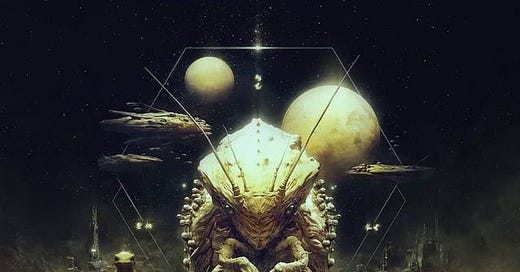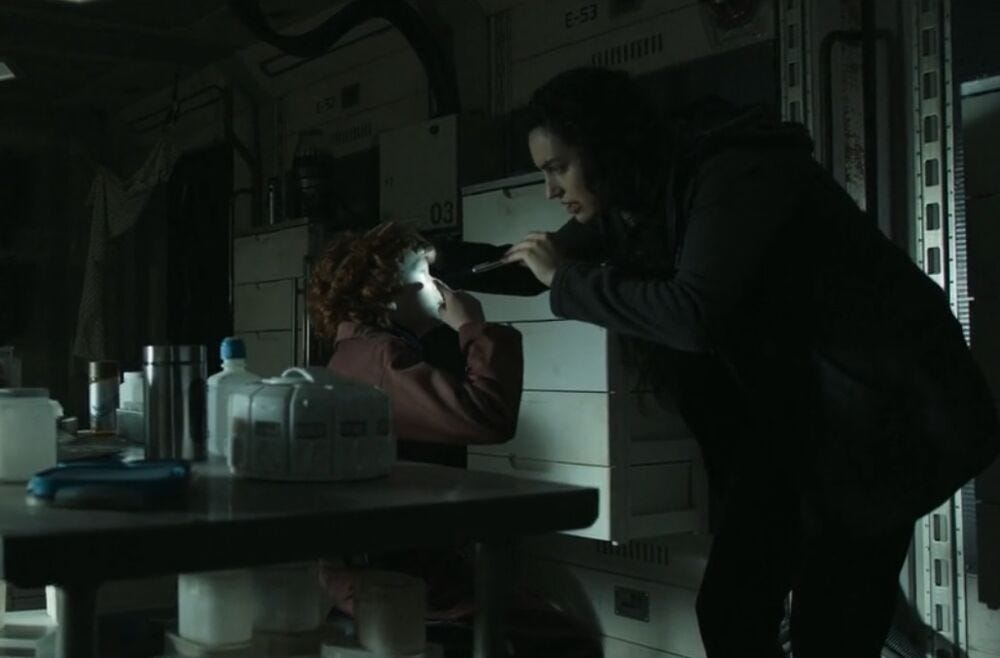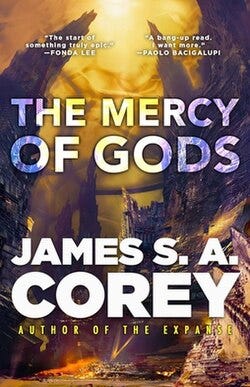James S.A. Corey is the penname for Daniel Abraham and Ty Franck, a cooperative duo behind some surprisingly good trade fiction. Franck was a personal assistant to G.R.R Martin during the period when the latter was actually writing books. Now, I’m not saying that he is the real author of A Song of Ice and Fire, I’m just saying isn’t it interesting that he left Martin’s employ in 2012 and there haven’t been any new books since then. But anyway, the duo is best known for their long hard-ish sci-fi series The Expanse, which was adapted into a television show first by SyFy (I hate it too but that’s what it’s called now) and then later Amazon Prime.
The Expanse is pretty great, with the first book especially knocking it out of the park by blending hard sci-fi, far-future magical alien tech, and detective noir. But these guys should win an award for least memorable book titles. Here’s all of them in order, and I defy anyone who has read these books to link any title after the first to the events contained in the book.
Leviathan Wakes
Caliban's War
Abaddon's Gate
Cibola Burn
Nemesis Games
Babylon's Ashes
Persepolis Rising
Tiamat's Wrath
Leviathan Falls
I read all of them, and while I could rattle off a bunch of major plot points in the series, I could not with a gun to my head tell you which of these books they happened in. Try it yourself, give yourself a point for each title (not counting the first) that you can remember the major plot movements. If you say you have more than 2 points I’m calling you a liar. Personally the only thing I know for sure is that Cibola Burn is the really boring one where they spend all their time on the alien planet that gives them algae infections in their eyes and there are poisonous slugs biting people.
The Mercy of Gods continues this dismaying trend with an absolutely forgettable title only tangentially and metaphorically related to the events of the book, which concern an alien invasion. It’s far in the future, with humanity having settled an alien world so long ago the inhabitants only know their origin story via myth and some scant archaeological evidence. But they know they’re not native to the planet, because there’s an alternate life tree that evolved there and they aren’t part of it. Luckily the original human pioneers brought an entire stock of earth life with them to seed the new planet, so now cows and honeybees and alders live side by side with all the alien plants and critters.
The setting is a group of research scientists attempting to merge the native life tree with the one humans brought. As a plot device this is a risky proposition: I can count on one hand the number of authors who manage to make scientists doing research compelling (Kim Stanley Robinson for one, early Michael Crichton for another). And it mostly doesn’t work here, but it doesn’t need to because aliens invade and subjugate humanity in the third or fourth chapter. This isn’t a major spoiler because I’m assuming that this gets discussed pretty often, and because it’s really just the prelude to the actual plot movement, which is this research group trying to survive and understand their captivity and their new place in the alien society.
The invaders are called the Carryx, a race of sentient lobster-like beings whose function in the universe is to domesticate all other races of sentient life, incorporating them into society as specialized servant castes. During the invasion we meet a couple of these client species, the giant millipede-like Rak-Hund and the cuddly but deadly Soft Lothark, who act as “animals of violence” to assist in the subjugation of new worlds and species, and we meet a handful of other sentient races as well.
In the second act the humans are transported in squalid conditions to the Carryx homeworld, and then in the third act and beyond the humans must learn about their new alien overlords and their place as the human moiety of a greater civilization. The research continues into this latter section, punctuated by interpersonal drama and politics and violence and some mystery, but still being basically research-driven. It doesn’t really work here either, but there’s enough other things going on for it to not bog down the narrative overmuch.
What I liked about the book is the same thing I liked about The Expanse: brilliant world-building and solid characterizations. What I didn’t like about it is what bothered me about The Expanse: meandering and uneven pacing. Despite being full of events, the book barely has a recognizable narrative arc with rising and falling action. It’s just one thing after another, all of it interesting enough, but usually not building to anything in particular. Most of the narrative feels on the cusp of major events that never arrive, and when they finally do they resolve with irritating quickness and simplicity. It’s not enough to turn me away, and I certainly read with interest to the end, but it keeps this book from the greatness of Leviathan Wakes or certain other stronger titles in their first series.
Apparently this is the first book in a trilogy called The Captive's War, which is a bit of a relief. Trilogies are good, they are lindy. Not every book series needs to be measured in the thousands of pages and decades of publication time. Even for writers as hard-working and prolific as these two, nine books is a lot to ask of a reader. So while The Mercy of Gods falls short compared to the explosive start of their previous nonology, I’m perfectly happy to give them the benefit of the doubt here. The stage is set, I’m ready to see what happens next.
Overall rating: cautious optimism







My Tin Foil Hat Theory is that books 6/7 of ASoIaF are ~95% done, but GRRM would hates the franchise for what it's become and probably especially what HBO has done with it, and would literally rather die than promote it anymore. Good thing is he's rich and old enough to get away with that as a plan. Once he dies, Book 6 will quickly be compiled by Franck and released with him given a byline, along with enough material for B7 and maybe a Book 8 "written from his notes" depending on book sales.
Also, you (and others) have inspired me to start my own Substack, which will mostly be short book reviews if random books, which feels resonant with some of your material here.
https://substack.com/home/post/p-165627931
Have you read the dagger and the coin series? Really enjoyed those books.
Also, interesting theory about George RR Martins assistant; didn’t know that about him lol